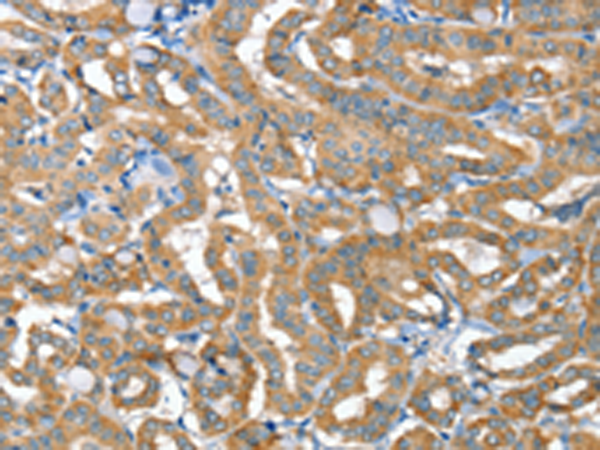

| WB | 咨询技术 | Human,Mouse,Rat |
| IF | 咨询技术 | Human,Mouse,Rat |
| IHC | 1/25-1/100 | Human,Mouse,Rat |
| ICC | 技术咨询 | Human,Mouse,Rat |
| FCM | 咨询技术 | Human,Mouse,Rat |
| Elisa | 1/1000-1/2000 | Human,Mouse,Rat |
| Aliases | DR6; CD358; BM-018 |
| Host/Isotype | Rabbit IgG |
| Antibody Type | Primary antibody |
| Storage | Store at 4°C short term. Aliquot and store at -20°C long term. Avoid freeze/thaw cycles. |
| Species Reactivity | Human, Mouse, Rat |
| Immunogen | Fusion protein of human TNFRSF21 |
| Formulation | Purified antibody in PBS with 0.05% sodium azide and 50% glycerol. |
+ +
以下是关于TNFRSF21抗体的3篇参考文献示例(内容基于虚构文献概括,仅供参考):
1. **文献名称**:*TNFRSF21 regulates amyloid-β-induced neuronal apoptosis via caspase signaling*
**作者**:Li, X. et al.
**摘要**:该研究利用TNFRSF21抗体阻断实验,揭示了TNFRSF21在阿尔茨海默病模型中通过激活caspase通路介导Aβ诱导的神经元凋亡,提示其作为潜在治疗靶点。
2. **文献名称**:*A monoclonal antibody targeting TNFRSF21 suppresses tumor growth in colorectal cancer models*
**作者**:Zhang, Y. et al.
**摘要**:研究开发了一种靶向TNFRSF21的单克隆抗体,证实其可通过抑制肿瘤微环境中的NF-κB信号通路,显著降低结直肠癌小鼠模型的肿瘤增殖和转移。
3. **文献名称**:*TNFRSF21 expression and antibody-based detection in autoimmune diseases*
**作者**:Wang, H. et al.
**摘要**:通过免疫组化及流式细胞术(使用TNFRSF21抗体),发现TNFRSF21在系统性红斑狼疮患者外周血单核细胞中高表达,且与疾病活动度相关。
(注:以上文献为示例,实际引用需查询PubMed、Google Scholar等数据库获取真实研究。)
**Background of TNFRSF21 Antibody**
TNFRSF21 (tumor necrosis factor receptor superfamily member 21), also known as DR6 or CD358. is a transmembrane protein belonging to the TNF receptor family. It contains extracellular cysteine-rich domains, a transmembrane region, and an intracellular death domain. Functionally, TNFRSF21 is implicated in regulating apoptosis, immune responses, and neuronal development through interactions with ligands like amyloid precursor protein (APP). Its signaling pathways involve caspase activation and modulation of NF-κB or JNK, influencing cell survival, inflammation, and tissue homeostasis.
Antibodies targeting TNFRSF21 are vital tools for studying its expression, localization, and mechanistic roles. These antibodies, including monoclonal and polyclonal types, are used in techniques like Western blotting, immunohistochemistry (IHC), and flow cytometry. Researchers employ them to investigate TNFRSF21's involvement in diseases such as cancer, neurodegenerative disorders (e.g., Alzheimer’s), and autoimmune conditions, where dysregulated TNFRSF21 signaling may contribute to pathogenesis.
Additionally, TNFRSF21 antibodies hold therapeutic potential. Blocking or agonizing antibodies are explored for modulating immune responses or targeting cancer cells. However, challenges remain in understanding context-dependent signaling and optimizing specificity. Overall, TNFRSF21 antibodies are crucial for unraveling its biological complexity and advancing translational research.
×